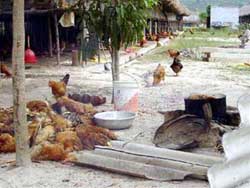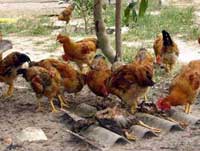According to recent reports, there have been instances of mass poultry deaths in several farms across Bà Rịa – Vũng Tàu province.
On the afternoon of November 10, we visited Tân Hòa commune in Tân Thành district to observe the situation regarding the outbreak at industrial poultry farms.
Using Dead Chickens to Feed the Living
 |
|
Mass Poultry Deaths |
Mr. Nguyễn Minh Châu’s farm in Phước Thành village raises 5,500 chickens, which are currently 69 days old. These chickens were supposed to be harvested 10 days ago, but due to a “frozen” market where traders are not buying, none have been sold yet. Mr. Châu stated that since November 8, the chickens have begun to die sporadically, and by this morning, over 200 chickens had perished.
Entering Mr. Châu’s farm, a foul smell was already noticeable due to the dead chickens from the previous night that had started to decompose before being buried. Mr. Châu reported that this morning he went to the Veterinary Department and the Department of Agriculture and Rural Development to report the sick chickens, but the officials merely advised: “Farmers should try to overcome difficulties, continue caring for the chickens, and wait for the province’s decision.” Returning home, he felt helpless, only able to gather the dead chickens and dig a hole to bury them in his yard!
|
Mr. Nguyễn Minh Châu: Poultry farm owner in Phước Thành village, Tân Hòa commune, Tân Thành: “We Can’t Wait Any Longer” Right now, we are very confused. The Veterinary Department advises farmers to keep the chickens and wait for directives from the province, but the pandemic shows no signs of ending, and the chickens are already past their harvest age. We have no money left to buy feed for them. With daily deaths among the chickens, we are hesitant to continue raising them. Therefore, we hope the government can swiftly intervene, allowing us to cull the chickens and provide partial financial support to help us resolve our debts. This is the best way to protect our family’s health and the health of the community. |
Approximately 1 km away, Mr. Vũ Quốc Hùng’s farm, which raises 17,000 chickens, is also experiencing mass deaths. What astonished us most was that Mr. Hùng did not bury the dead chickens but instead gathered them to cook and feed to the living chickens.
Mr. Hùng explained: “This way, it saves on feed costs for the chickens (!)”. He also mentioned that his family had reported to the district veterinary officials and requested to cull the chickens, but they responded: “There is no directive from the government; if the family culls the chickens, they must take responsibility themselves.” Moreover, the veterinary agency has not provided any additional guidance regarding the current situation!
Currently, in Phước Thành hamlet, there are six large poultry farms with a total of 70,000 chickens, most of which are overdue for sale, yet remain unsold. Most farms are reporting instances of chicken deaths, leaving the farm owners deeply concerned.
Authorities Turning a Blind Eye!?
Given the inability to sell poultry and the mass deaths occurring, farmers find themselves in a situation that feels “half-laugh, half-cry.” With a flock of 5,500 chickens, Mr. Châu spends nearly 3 million VND daily on feed. If these chickens are culled, his family will incur a loss of about 160 million VND. Now, unable to sell the chickens while still having to spend money on feed daily, his savings have run out. He has reduced the feed quantity and allowed the chickens to roam freely. Currently, Mr. Châu still owes the bank 18 million VND and has borrowed another 35 million VND from outside sources.
Mr. Vũ Quốc Hùng’s situation is even more dire. With 17,000 chickens, he spends nearly 10 million VND on feed each day. After 90 days of careful nurturing, he thought he could recover losses from last year’s outbreak, but now he faces a massive debt. This batch of chickens has consumed nearly 700 million VND in feed, forcing Mr. Hùng to mortgage two land use rights certificates to Uni-President Vietnam and sign contracts with feed dealers amounting to nearly 300 million VND.
The most alarming aspect is that the farm owners and poultry raisers are still “living with the chickens.” Especially those directly caring for the chickens, they have no protective equipment while tending to them, even when collecting the dead chickens. Many even sleep in hammocks right among the chickens. Family members casually enter and exit the farms as if nothing is amiss. Most farms are located within residential areas.
 |
|
Living Chickens Eating Dead Chickens |
Mr. Mai Xuân Phụng, head of Phước Thành village, stated: “Out of concern for the health of farmers and surrounding residents, I have been wanting to raise the alarm these past few days. I can only encourage and comfort the farm owners and advise them to carefully bury the dead chickens to protect their health and the community’s health.”
This situation is not only occurring in Tân Hòa commune; many sources also indicate that mass poultry deaths are happening in several farms in Vũng Tàu City. However, local authorities still appear indifferent and have yet to conduct tests on sick chickens to determine the cause. Furthermore, there has been no directive on how to handle the farms with dead chickens. Farmers are left confused, unsure of what to do; no one is buying their chickens, and keeping them incurs high costs while posing significant risks of spreading avian influenza to humans.
|
Mr. Trần Tiến Hăng, Vice Chairman of Tân Hòa Commune People’s Committee: “The local government hopes for prompt solutions from higher authorities regarding the mass chicken deaths” Currently, Tân Hòa Commune has nine large poultry farms, with six still having chickens that have not been harvested. Most farm owners are struggling farmers. Due to the impact of avian influenza in previous years, many households are still in debt to feed companies. In light of the current mass poultry deaths, we hope the provincial authorities and the Department of Agriculture and Rural Development will urgently review the situation and make timely decisions on how to address it. The sooner this is done, the better to alleviate public concerns and ensure environmental sanitation, preventing the risk of disease spread. We also hope the government will provide financial assistance to farmers with sick poultry. |


















































